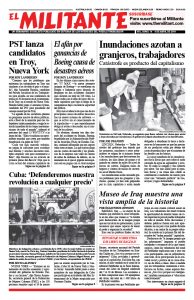LONDON — The government’s decision to revoke the citizenship of Shamima Begum, who left the U.K. at the age of 15 to join Islamic State in Syria, has stirred heated discussion here. The capitalist rulers in a number of countries are debating what they will do with the thousands of other members of the reactionary sect seeking to return home as IS is defeated in Iraq and Syria.
Born in the U.K. to Bangladeshi parents, Begum joined IS in 2015 along with two school friends. Interviewed in a Syrian refugee camp in February, she said that she didn’t regret joining Islamic State but now wanted to go back to the U.K. with her child. Instead, Home Secretary Sajid Javid revoked her citizenship. Barred from returning home, Begum’s child died in the camp.
Knocking on doors to introduce the Communist League in east London, in the area where Begum was brought up, this correspondent and Julie Crawford spoke to Aziz Ali, a young accountant, in Bethnal Green.
Asked whether she thought Begum should be allowed to return, Ali said, “Well she left the country.”
“Yes, she was attracted to the reactionary course of Islamic State, but working people should oppose the government’s move to revoke her citizenship,” Crawford responded. “Workers have a stake in this because the government will use it as a precedent against people engaged in working-class struggle.”
Ali considered this. She noted that Begum, was only 15 years old when she left.
“My standpoint is not out of sympathy for her,” Crawford said. “She voluntarily joined this brutal outfit. My concern is what is in the interests of the working class.”
During its reign of terror across large parts of Iraq and Syria, IS drove millions from their homes and slaughtered others it accused of breaching its edicts or who held different religious beliefs. As its despotic rule comes to an end, cultural and literary events that Islamic State forbade are beginning to flourish in towns and cities where it once held sway and better conditions exist today for working people to engage in political activity.
In 2002 the Labour government made it easier to revoke U.K. citizenship, as part of a raft of “anti-terrorist legislation” that restricts workers’ rights. Three years later Prime Minister Tony Blair called for making it “simpler and more effective” for the government to deprive a person of citizenship.
An amendment to the law, adopted in 2014, further simplified this process. Then Home Secretary Theresa May ruled this could be done “if the secretary of state ‘is satisfied’ that a second citizenship can be obtained elsewhere.” The number of people deprived of British citizenship has surged since then, from 14 in 2016 to 104 in 2017.
There have been challenges to the new powers taken on by the government. In November 2018 the Special Immigration and Appeals Commission struck down a court decision to deprive two men accused of being “Islamists,” of their citizenship. The court ruled that the order rendered them stateless and therefore violated international law. The government is appealing the verdict.
The Bangladesh foreign ministry denied claims that Begum is a Bangladeshi citizen. “She is a British citizen by birth and has never applied for dual nationality with Bangladesh,” the ministry said. “There is no question of her being allowed to enter into Bangladesh.”
Begum remains at the al-Roj refugee camp in northeastern Syria. Elsewhere in Syria at least 12,000 women and children, including thousands from abroad, are trapped in limbo in similar camps. Aid workers report having insufficient tents, water and food supplies there to meet the needs of the rising numbers of people seeking protection after Kurdish-led Syrian Democratic Forces attacked and then took Baghouz, the last IS-held town in Syria.

